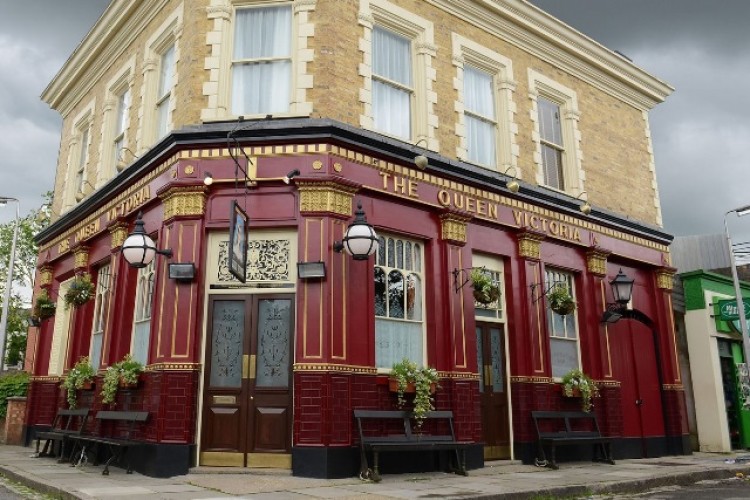The BBC originally planned to complete E20 in October 2020 at a cost of £59.7m. However, it is now scheduled to complete the programme in May 2023, 31 months later, at a cost of £86.7m.
The works at BBC Elstree Centre no longer represent value for money for licence fee payers, the National Audit Office (NAO) has concluded in a damning report.
The BBC built the external filming set for EastEnders, including Albert Square, in 1984, and originally planned to use it for two years. It has lasted for 34 years but is no longer fit for purpose. The poor condition of the set means the BBC cannot film in high-definition, degradation has led to increasing filming delays owing to stoppages in production due to health and safety concerns, and there are ongoing maintenance costs to ensure filming can continue.
In 2013, the BBC proposed building a temporary set, two-thirds of the size of the existing external filming site, to use while it constructed a new permanent set. It expected E20 to cost £59.7m and to be completed by August 2018. Due partly to forecast cost increases, the BBC substantially revised its plans in 2015, moving its target completion date to October 2020.
The case for E20, and the rationale for the current approach, is clear the NAO accepts. However, in October 2017, the BBC reported internally that its revised plans were no longer achievable due to forecast delays and cost increases.
As a result of more realistic plans, the BBC now forecasts E20 will cost £86.7m – 45% more than the original budget. Most of this increase relates to the higher cost of the Front Lot, which the BBC now estimates will cost £54.7, which is £23.5m or 75% more than planned. Following negotiation and clarification around the Front Lot construction contract, including the type and supply of bricks required, Wates Construction was appointed by the BBC in September 2018 to carry out the work at a fixed price of £24.2m, which is £9.5m more than the BBC budgeted in October 2015. The BBC expects the Front Lot to be completed at the end of March 2021, 22 months later than originally planned.
The BBC’s cost consultant on the project is Aecom.

The NAO found that delays have primarily stemmed from: procurement delays, as limited market interest from construction companies resulted in the BBC revising its approach; subsequent contract negotiations taking longer than planned; and more realistic assumptions about the time needed to age the newly-built Lots.
The NAO considers that some of the reasons for the delays and cost increases could have been addressed earlier by the BBC. Early planning processes resulted in the BBC underestimating aspects of complexity, cost and risks of its approach. There was also insufficient construction project management expertise to identify critical design issues. Furthermore, while they did engage with each other, the programme team and EastEnders production (the end users of the set) were not sufficiently integrated, leading to ineffective design development and change processes.
The BBC has also faced issues such as higher than expected inflation in the construction sector, as well as asbestos and obstructions in the ground which to some extent were unforeseen by the programme team, partly due to poor site records. Inflation has had a greater impact than it would have done had the programme completed without any delays.
Lack of initial interest from contractors was attributed by Aecom “to the highly bespoke nature of the programme and the economic environment making contractors more selective”.
This itself delayed the programme by around six months and increased costs by an estimated £2.3m, although the BBC avoided further delays by separating the enabling works from this contract and carrying them out within its existing Boiler House contract. The BBC, acknowledging that its original single-stage approach had not worked, moved to a two-stage procurement with contractors on its construction framework in early 2017. Three contractors bid and two met the BBC’s assessment criteria. During an initial stage, Wates was appointed by the BBC in April 2017. The second stage involved Wates seeking more clarity about the BBC’s requirements and design before proposing costs for various elements of the work. There were around 11 months of negotiations – six months more than planned – between the contractor and the BBC. This was owing to Wates’ contract price offer being higher than the BBC anticipated, the need to finalise clarifications, allocate risks, and confirm provisional sums, as well as both parties agreeing the type and supply of bricks for the Front Lot.
Amyas Morse, the head of the NAO, said: “The BBC will not be able to deliver value for money on E20 in the way that it originally envisaged. It is surprising that some of the reasons for this were built in from the beginning. Despite recent project management improvements, E20 is late and over budget against its 2015 plans. We believe that the planned benefits are still broadly achievable, but given the high-risk nature of E20 it will need close scrutiny until it is finished.”
Got a story? Email news@theconstructionindex.co.uk



